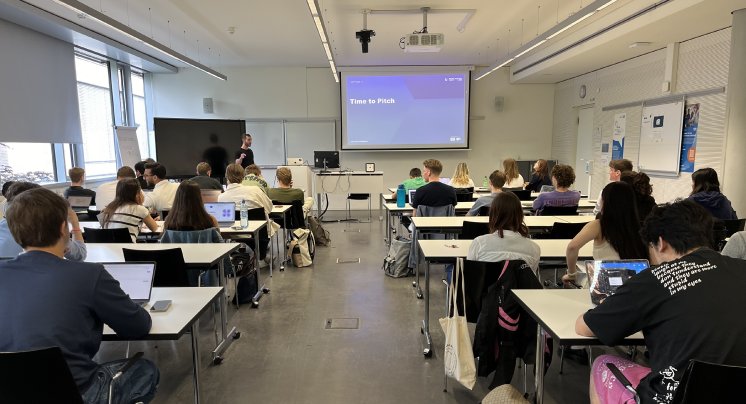At the beginning of June, 13 teams presented their visions for possible start-ups of the future in a pitch session. One of the mentors for young academics is Alina Hafner, a doctoral student at GCFE. Thanks to her own experience as a start-up founder, she was able to provide insights into the highs and lows of the start-up process: "In the lectures, I also talked about my mistakes, especially when it came to fundraising. Hopefully they won't make the same ones."
From the idea to the concept
Jan Blasius and Jan Bastian, two coaches from the TUM Venture Labs who have been based on the education campus for several months, were at her side. Their motivation: "We at TUM Venture Labs want to be close to the students. After all, they are the founders of tomorrow," explains Blasius. It is not yet clear how many of the concepts presented will be realized. However, the added value for the second-semester Bachelor students is obvious to Hafner: "It's easy to have ideas, here they have learnt how to validate them."
One of the students taking to the pitch stage on this day is Inga Müller. With her team "FreshRec", she wants to counteract food waste. An app is designed to sound the alarm in the fridge when the best-before date expires: "As I don't have much time to cook, I often have to buy more food because it has expired," explains the 20-year-old Management & Technology student. This costs a lot of money and is not sustainable. What future prospects does the concept have? "I don't see myself as a start-up founder, but the workshop was really cool and I learnt things that I wouldn't otherwise have come into contact with," says Inga.
A question of taste
Sahil from India was also concerned with food, but in a completely different context. For him, too, personal involvement played a decisive role: "Indian food is the only thing I miss here in Germany, and what is offered as Indian food in restaurants here has little to do with its origins." He and his team want to change this and set up a delivery service for authentic Indian food. A positive side effect of his research: "I was able to cook a lot and try different dishes during and because of my work."
Whether and which idea the students will pursue further remains to be seen. In any case, they have learnt one thing from the presentation: "One of the most important characteristics of founders is to explain complicated things simply," says Jan Bastian. The project and teamwork was challenging, but in the end, all the teams can be proud of what they have achieved. If Alina Hafner has her way, the cooperation will continue: "The collaboration with TUM Venture Labs was excellent. It is very cool to have this ecosystem here. Heilbronn will benefit greatly from it in the long term."


